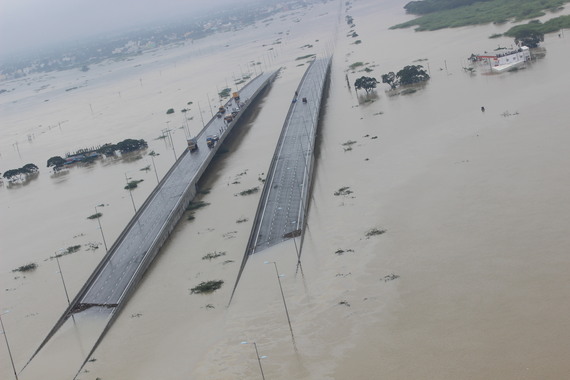Chennai, India. December 1st, 2015.
Today it rains further incredible torrents after several weeks of the worst monsoon in 100 years.
Electricity has been out for days for large swaths of the city. The airport is closed with water over the tires of airplanes, roads are rivers. Homes have been lost, hundreds of people have died.
The army has been called in to deliver food packets (stamped with the face of the state's movie-actress chief minister) and Prime Minister Modi is on the scene donating billions of rupees (which friends here say will mostly disappear before reaching those in need).
I'm fortunate to be staying at a place not so severely impacted by the floods. I'm staying at Vasanta Vihar, which was the home of J. Krishnamurti, and is now a Krishnamurti retreat and study center.
My yoga teacher in Chennai told me on a previous visit that this place is paradise. It's true. It's not just the natural beauty of Vasanta Vihar -- the green abundant trees, the birds of all kinds, the little frogs and the insects, the surprising flowers, even the giant bats that cross the sky at dusk -- but it's the spirit here that feels like home again and again.
Have you ever read or listened to J. Krishnamurti? He was a philosopher and spiritual teacher that lived 1895-1986. He came out of the Theosophical Society and was heralded as the World Teacher, the incarnation of the Buddha and Jesus, the Maitreya.
What is extraordinary is that he gave up the organization around this image of him in 1929, saying "truth is a pathless land," and "there is no spiritual authority." He gave up land, wealth, position and followers. Why? Because he said had found something deeper and richer that he would spend the rest of his life sharing with the world.
His great discovery is that it is thought that creates our center, the sense of me. Krishnamurti saw the self as a bundle of memory, thoughts, that move from the past to the future. Thought creating our sense of time, thought creating fixed images, including the self-image of a "me" moving through time, through knowing and becoming. Like the Buddha, Krishnamurti saw the self as an illusion. Something rarely questioned in daily life.
Krishnamurti suggests that the answer to problems always lies in the problem itself, not away from it. He would begin his talks with looking at the crisis in the world and then go on to say we cannot solve world problems by social projects or political reform. This is a radical idea considering we spend so much energy focusing on what politicians are doing or not doing, or on outward fixes.
K, as he also sometime referred to himself, pointed out that problems are rooted in the minds of individuals, so no outer reform can solve human problems fundamentally. As long as there is greed in the hearts of men there will be problems on a global scale.
And this is the other story behind the Chennai floods: While I was here, news broke that this was not entirely a natural disaster, but might reflect the greed behind the lack of urban planning in an area known for monsoons. Were the floods waters the waters of our own self-centered actions? Was the outer chaos, as Krishnamurti suggests, a reflection of the inner confusion?
From a diary entry written while in Chennai: "There is so much suffering in the world, and being here in India during this flood is a devastating reminder of that. There is so much sorrow, so much craziness. Back in Southern California, there's been another mass shooting. And we are on a seeming super-highway to self-destruction considering our relationship with the environment reflected in climate change. It seems that many people, in spite of outward success or possessions, might be deeply unhappy. But are we even aware of our inner state or are we concerned with our own little problems, with getting better, getting more, being successful, personally evolving?"
If you explore Krishnamurti's teachings further, you find that he is also pointing out that you can not change greed into non-greed by actions of will, or the desire for self-improvement. A new kind of learning about ourselves is required; one that will, without effort or desire for a particular result, end up transforming the world. A quality of this learning is that it sees the inner and outer as a single movement.
Asked with a genuine sense of learning, this becomes the most radical spiritual question:
Who am I?
The invitation in his teachings is to make a quantum leap out of the field of the known, and into the unknown. He asks us to discover for ourselves:
- About who we truly are, beyond identification, beyond internal or external authority, beyond thought.
- That this inquiry is the movement of meditation.
- That with meditation one opens the door to love.
And perhaps it is only love that is the answer to all our problems, not romanticized love, but love as a fierce human potential.
We need that kind of flood now.
"There is no self to understand, only the thought that creates the self." -- J. Krishnamurti
